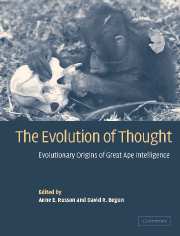Book contents
- Frontmatter
- Contents
- List of Contributors
- Preface
- 1 Evolutionary reconstructions of great ape intelligence
- 2 Enhanced cognitive capacity as a contingent fact of hominid phylogeny
- PART I COGNITION IN LIVING GREAT APES
- PART II MODERN GREAT APE ADAPTATION
- PART III FOSSIL GREAT APE ADAPTATIONS
- Introduction
- 13 Paleoenvironments and the evolution of adaptability in great apes
- 14 Cranial evidence of the evolution of intelligence in fossil apes
- 15 Life history and cognitive evolution in the apes
- 16 Fossil hominoid diets, extractive foraging, and the origins of great ape intelligence
- 17 Paleontology, terrestriality, and the intelligence of great apes
- 18 Body size and intelligence in hominoid evolution
- Part IV INTEGRATION
- Author index
- Species index
- Subject index
15 - Life history and cognitive evolution in the apes
Published online by Cambridge University Press: 20 August 2009
- Frontmatter
- Contents
- List of Contributors
- Preface
- 1 Evolutionary reconstructions of great ape intelligence
- 2 Enhanced cognitive capacity as a contingent fact of hominid phylogeny
- PART I COGNITION IN LIVING GREAT APES
- PART II MODERN GREAT APE ADAPTATION
- PART III FOSSIL GREAT APE ADAPTATIONS
- Introduction
- 13 Paleoenvironments and the evolution of adaptability in great apes
- 14 Cranial evidence of the evolution of intelligence in fossil apes
- 15 Life history and cognitive evolution in the apes
- 16 Fossil hominoid diets, extractive foraging, and the origins of great ape intelligence
- 17 Paleontology, terrestriality, and the intelligence of great apes
- 18 Body size and intelligence in hominoid evolution
- Part IV INTEGRATION
- Author index
- Species index
- Subject index
Summary
INTRODUCTION
It has become almost axiomatic in discussions of brain size increase within primates that causation lies with cognition. However, it is also worth exploring other possible causative factors. For instance, it has long been known that within mammals, brain size is broadly correlated with the pace of life history (see Deaner, Barton & van Schaik 2003; van Schaik & Deaner 2003, and references therein). It is not surprising therefore that large-brained great apes have greatly prolonged life histories compared with smaller-brained monkeys (Harvey & Clutton-Brock 1985; Harvey, Martin & Clutton- Brock 1987; Kelley 1997). In discussions of the life-history/brain size relationship, particularly concerning human evolution, the arrow of causation is almost universally suggested to point from brain size to life history. In this view, life-history changes are passive consequences of selection for brain size and by implication, cognitive capacity. However, this is contradicted by a substantial body of theory and empirical evidence pointing to species demographics in the shaping of life history. The relationship between brain size and life history could also be due to correlations to another variable, such as body size, without any direct cause-and-effect relationship between the two, but this seems unlikely (van Schaik & Deaner 2003; and below).
There are further difficulties with the proposition that selection for enhanced cognitive capacity leads to increasing brain size.
- Type
- Chapter
- Information
- The Evolution of ThoughtEvolutionary Origins of Great Ape Intelligence, pp. 280 - 297Publisher: Cambridge University PressPrint publication year: 2004
- 20
- Cited by



